Chainn went live on November 1, 2018. Evert-Jan van Vliet, Pieter de Jong, and Kees and Leo van den Heuvel - veterans of the fruit and vegetable trade sector - launched this new business platform. They wanted to meet buyers' and producers' need for transparency, traceability, and efficiency in the chain. Three years later and Chainn, which now employs 20 people, has introduced a new corporate identity, and moved into the top floor of a building on the A15 motorway near Barendrecht, the Netherlands. "We're the first fruit and vegetable company with the know-how to openly connect all the links in the chain," says Michiel Bontenbal, who took over as Managing Director on March 1, 2020.
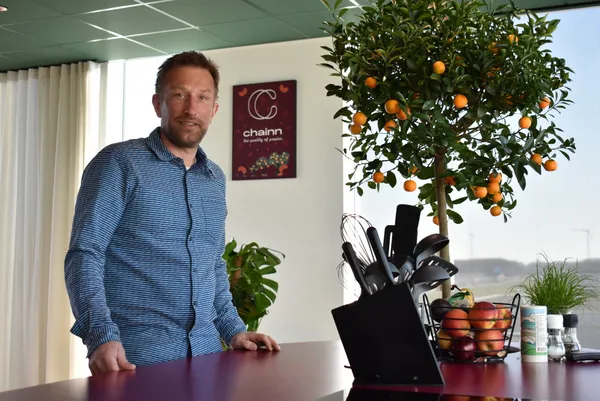
Michiel Bontenbal, Chainn
You want to move toward a transparent chain. How will you do that?
Transparency has become a catch-all phrase. But we're the real deal. Producers and buyers can see what's happening anywhere along the chain. They can use our specially developed app to gain real-time insight into the entire food chain. We want our model to be completely open, but they can choose how open they want to be. We use Oracle - an American ERP package system - much of which we've had customized. This package was built, from scratch, in the cloud. The specially developed app is the lens through which you look into our system. Users can see a product's exact status. Is it already sold, in stock, or on its way to the customer? Things like inspection, cooling or storage costs are also made clear.
As soon as a product is sold, that price becomes known. Suppliers can then see that, for example, we charged a retailer in Sweden €6 and that, at the end of the day, he gets €5. Chainn gets a previously agreed-upon cut. The perfect scenario - which must ultimately be 80% of our total turnover - is sending the supplier's invoice directly to the customer. We don't have to be the go-between. If growers form a bond with buyers, we believe the 'incentives' will move in the right direction. Then growers will understand what clients want, and clients will have a far better understanding of the struggles growers face.
Why have you revamped your house style after just three years?
At the start, it seemed people thought Chainn was very much about the platform. That caused a kind of language confusion because people thought we'd become a software supplier or a marketplace. The style also looked more like an IT company than a fruit and vegetable connector. We had the right ideas but didn't know how to express them. After several strategic sessions, we rolled out a new corporate identity that much better embodies our passion for our work.
How did producers react to this business model?
Very differently. When Chainn started - I wasn't involved yet - a group of growers was immediately enthusiastic about the idea because they trusted the people here. Most of them didn't even know exactly what was going to change. In the meantime, many more suppliers have joined us. This model is particularly useful for Spanish vegetable cooperatives. They usually struggle to market their goods elsewhere in Europe and have often felt used by brokers. We provide the answer - a company that works truly transparently. That doesn't always lead to more profit, but they know the prices communicated are the prices actually paid.
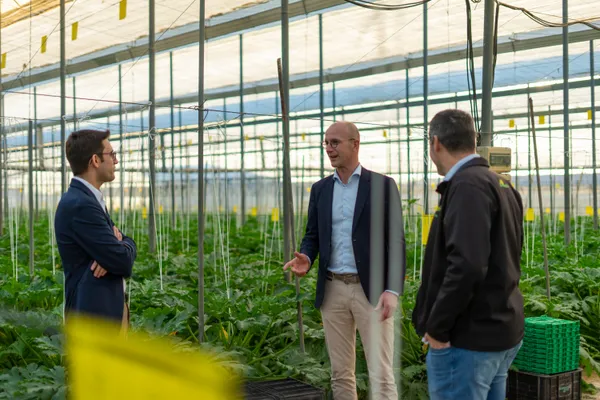
Suppliers and customers indicate beforehand how open they want to be. Openness equals responsibility. All growers want to be transparent if selling prices are high. However, the entire model is transparent, even if prices are dismal. You don't just reap the rewards; you have to bear the burdens too. That's quite something - some growers can't handle it if their product is sold below cost price. Producers say, in advance, how open they want the chain to be. That's why some growers opt for a minimum guaranteed price, which is also fine. That gives us the chance to possibly make a bit more profit.
And how did your clients react?
Also, very differently. There are always those customers who want to keep buying at low prices. They can naturally approach us for a pallet of oranges or zucchini, but these are the least attractive buyers for us. Our retail clients like having direct contact at the source, and that's where our platform, certainly in its ultimate model, provides a solution. I don't think many retailers will use our app, but we do create that opportunity for them. In practice, however, it's mainly the growers who have the greatest need for a transparent chain.
Will such a business model not make you redundant in the long run?
I think, at some point, we'll have to do less and less on behalf of our suppliers and customers. But that's not a bad thing - the world is truly big enough. If a client's visiting Spain or Morocco, we put them into contact with our suppliers. So, we don't have to beat around the bush about clients with suppliers. Our suppliers build relationships with customers, and our specialism and market knowledge add value to that. Because this will cost increasingly less with us, we can offer it for a lower and lower margin. The trade we do is more of a service to growers.
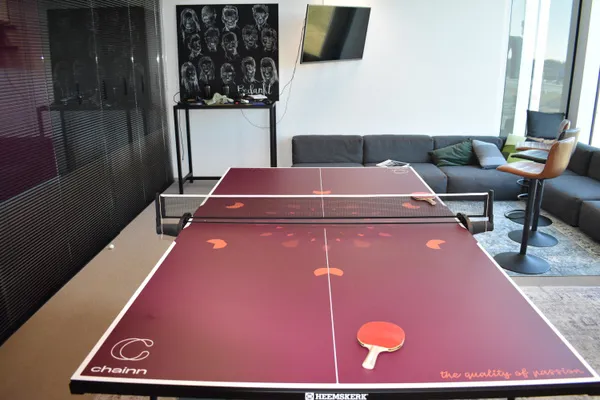 Chainn style table tennis table
Chainn style table tennis table
But some growers, like the Spanish grower Berdea, known for its King zucchinis, entrust us with their entire product sales. This medium-sized zucchini grower has a premium product and wants to remain a grower. They’ve asked us to take care of some of their sales in Europe. Some 80-90% of the production is packed and shipped directly to retail customers. But zucchinis have peak production times and sometimes produce non-standard sizes. In that case, they send the zucchinis to the Netherlands, and we serve other markets. The situation is somewhat different for citrus, which often arrives here all at once. Thanks to its longer shelf life, slightly more of these are sold from stock.
We bear the growers' risk and responsibility, but it's still their product. Once retailers offer a price, we ask the grower whether he agrees. Of course, we advise, but the relevant grower ultimately decides if he wants to sell at that time. We monitor the margins closely because we think the agreed percentages reflect the value we represent well. And I genuinely don't mean just on the upside. If we can get higher prices, we try to get the grower to benefit. We, thus, ensure we continuously add value and bind suppliers to us. We can achieve this with a relatively sharp margin and a well-oiled system.
It all sounds ideal, but you have to contend with supermarket tender prices, don't you?
Chainn doesn't partake in and doesn't want to take a position in that. It is, obviously, sometimes tricky if we are approached by an interested retailer. But, when it comes to tenders and working on seasonal prices, someone in the chain is always losing, often at one end. We try to be highly efficient, but we want growers to get fair prices for their products. If we give in to tenders, we give up our business model. At Chainn, you don't have to go for the cheapest goods. Growers can, of course, participate in tenders if they so wish. Within our system, growers can take that risk if they want to, and we'll do so on their behalf. But that's solely their choice.
How did you end up at Chainn?
Four shareholders, Evert-Jan van Vliet, Kees and Leo van den Heuvel, and Pieter de Jong started Chainn. They divided the shares equally and realized nice revenues after the first year. However, they also realized that while they were doing a lot of business, they weren't building the organization. They were quickly becoming immersed in daily operations, which they liked best. But they were missing the bird's eye view. So, they approached me to become a director.
The organization is super flat and really works as a team. The big advantage is that the founders can pay a lot of attention to, say, their Spanish or South African supplier or German customer. The company has a great deal of knowledge at its helm. In many companies, such people are removed from the process, becoming responsible for an increasingly larger package, or having to manage more. While everyone knows a good trader or account manager isn't always a good staff manager.
Was there an internal switch to this new business model too?
For sure. We've truly evolved. When I started here, everyone was at work by 06:45. Prices had to be adjusted from 07:00 onwards. Everyone was extremely busy with all kinds of day-to-day tasks until 11:00. And yes, that was often better, profit-wise. But we had to start over every time and ask ourselves, over and over, what we were doing. Strategic sessions helped with that. And day trading isn't our core business. That's how we got to where we're now, starting at 07:30. And we're selective regarding the growers with whom we work. We've had to learn that growers can't just shove all their trade on us. We do everything to help our growers, but we don't want to be a dumping ground.
How important is product specialization for you?
Extremely. We have several specializations - citrus, vegetables, and melons. We don't do so much citrus during the Spanish season, as we doubt we can add much value. Then we become traders again, precisely what we don't want. However, we do considerable volumes from the Moroccan to the overseas season. For vegetables, on the other hand, we work much more with [Spanish] cooperatives from Murcia and Almeria for greenhouse and open-field vegetables and herbs. Morocco, too, is a major supplier. There's an increasing need for a good tomato grower, especially for TOV, from there.
We're also very strong in melons during certain periods. We don't have to be a year-round supplier of all products. Why would we supply Dutch greenhouse vegetables? The cooperatives and sales organizations take good care of those growers. We can't add anything. Of course, we could tie a bell pepper grower to us, and they'd certainly get a good price for their product, but that's not why we're here. After all, ten other companies can do that too. So, product specialization is crucial to us.
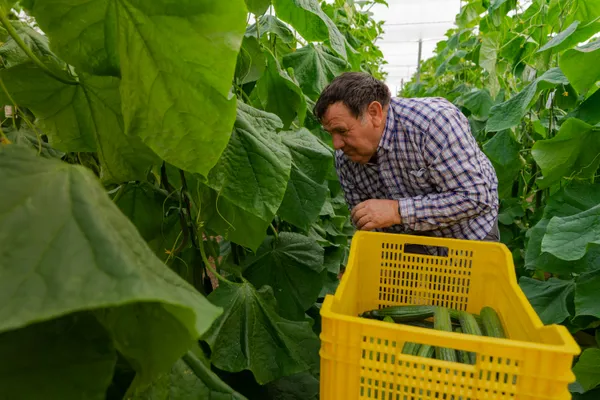
In the early days, we grabbed every opportunity presented to us. Not anymore. That's not to say we'll never expand our range, but before we do so, we must undoubtedly be adding value. If so, and we have the right growers and buyers, we can take that step. But we don't want to become a company that wants to sell the entire assortment to everyone. I believe much more in occasionally saying no than yes to everything. People who want to sell everything should work in the market. They are semi-specialists; they're jacks-of-all-trades but masters of none.
How are your sales divided, segment and market-wise?
We have clients throughout Europe. In the Netherlands, we serve some major retailers and the processing and hospitality industries. We cater to these three segments in many countries. With our vegetables, for instance, we're well represented in Scandinavia and the Eastern European market. The most growth opportunities for these are in Germany. With citrus, we're again a major player in the Dutch hospitality sector. And, outside the Spanish season, we're also making inroads in France and Spain. We supply non-contracted produce to intermediaries too. We do that seriously and try to exceed their expectations, but that's not the crux of our business.
How is the situation in Ukraine affecting your trade?
That’s a very tense situation. We believe trade will find its way there again, eventually. Because, at the end of the day, Russians and Ukrainians need to eat as well. We did virtually nothing in Russia and not very much trade in Ukraine either. However, many Egyptian citrus growers who usually sell a lot to Russia have now come knocking. Typically, prices would drop, but the costs of raw materials, transport, and packaging are substantially higher. This is an unholy dilemma. After all, you feel responsible for the producers with whom you work.
Spain is facing the same situation, particularly regarding the high energy and raw material prices. And supermarkets' reactions to price increases lag behind when growers feel them. Quotes are sometimes withdrawn because they're simply unrealistic. We usually work almost exclusively on a contract basis, but this is why we’re deliberately reducing some products' agreed volumes. We'll definitely get these volumes at some point. But, if you lay down everything in contracts now, someone pays the price. Then you're not serving either your customer or supplier well.
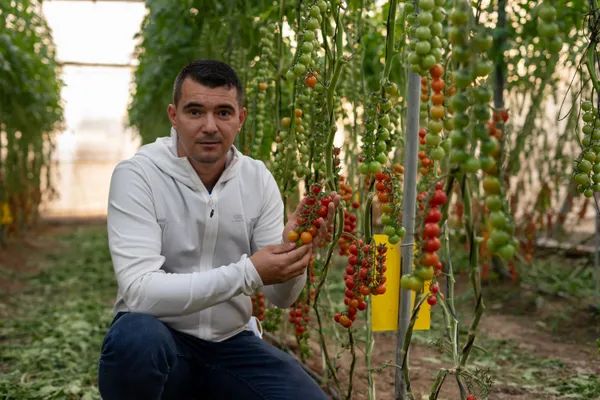
Have there been suppliers who wanted to be part of Chainn?
Yes, of course, but we deliberately chose not to do so. It would provide more financial reach, but with our business model, you need fewer financial resources than with the traditional ones. We want to go deeper into the chain, not look for the biggest trading parties. We want to give growers the chance to sell their products at fair prices.
You worked at Looye Kwekers, one of the few Dutch branded fruit and vegetable companies, for more than 16 years. Can you use that experience here?
That's one of the things I do miss a little. As a grower, you're your product's boss, and you can do what you want with it. In my previous job, we were in with almost all the retailers. We don't have that here. We do want to build a quality hallmark for citrus, so consumers are always guaranteed tasty oranges. I think that's a gap in that market. Currently, the quality of a net of oranges is too erratic. When people believe they're not tasty, they don't buy them for a while.
Do you try to find niche products like special varieties or, say, organic products?
We do offer a reasonable number of organic products in our range, but we don't do the real niche varieties. We do try to carry top-of-the-range products. Our zucchinis and oranges, for example, are genuinely above the market average. And we pay premium prices for them.
Is product availability an issue?
For some products, yes. For instance, this season's melon supply was super tight. The citrus supply is usually more volatile. The lemon market has been reasonably good in recent years, but prices are coming under more pressure now that a lot has been planted. Of course, we're dealing with a natural product, but we seldom run into real problems due to sudden shortages. That's also because we work so transparently. If it rains so much that crops cannot be harvested, customers have a greater understanding for the growers’ circumstances. We also inform our clients of crop cultivation developments via, among other things, a weekly report. They then know they need to be alert in case of, for instance, bad weather.
Would it not be better to be 'on top of' your trade, for example, in a trade centre?
If that were the case, we'd have to travel. More than 80% of our trade goes directly to our buyers; we don't see it again. That means no intermediate links, direct transport to the customer, and, therefore, much fresher products. We like operating a little out of the wind, below ground level. We have no ambition to set up a warehouse. Our logistics partners are close by, and they're well-engaged in that different line of business. Few people can do that really well.
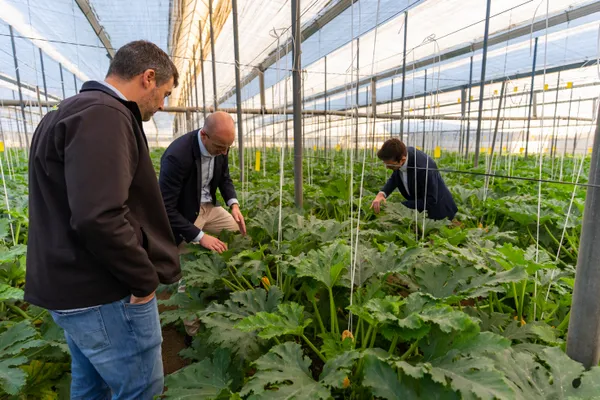
The same applies here: if you can do this well, feel free to do so, and we'll not offer you those services. But, doing everything yourself often means you're only doing so at 80% of a true specialist's level. Chainn is also deliberately not located at the [nearby] trade centre. You’re affected by that which surrounds you. That may sound strange. But before you know it, all those fellow companies will compel you to operate more as a trader. We prefer to stand on our own strengths.
What do you look for in hiring new employees?
We don't rely on experience. We work a lot with young, preferably well-educated talent. Also, I like working with lots of different types of people from various cultural and religious backgrounds. If I were to attract many old-school fruit and vegetable sales wizards, the company would regress into a bygone era. We want to avoid that. We apply the principle of 'if you know the answer, speak up'. By that, we mean leave the specialist to do their job. If a junior staff member gets more proficient at something than an old-timer, that younger employee must get a chance to shine.
We want to make the job as pleasant as possible. That's why the new office is as welcoming as it can be. For example, it's someone else's turn to organize a tasty lunch every day. We hold that team spirit dear. Our passion ensures we keep challenging ourselves and keep trying to improve our services every day. We'd like to add a retail account manager to the team, someone who understands the game. Some experience is certainly desirable, but they may have gained that in other fresh produce sectors.
How did the pandemic affect the company
I started in March 2020, so my sole experience of the company is pandemic related. It's been mostly good for us. Naturally, I say that with all due respect to people who've been negatively affected by COVID-19. We missed out a little on hospitality sales, but our retail buyers more than made up for that. It was also ideal to have the whole team together for two years. You can really build a team, especially now that we're introducing a new model. That would never have been possible otherwise because there are always people traveling. That's allowed us to build a strong, close-knit team.
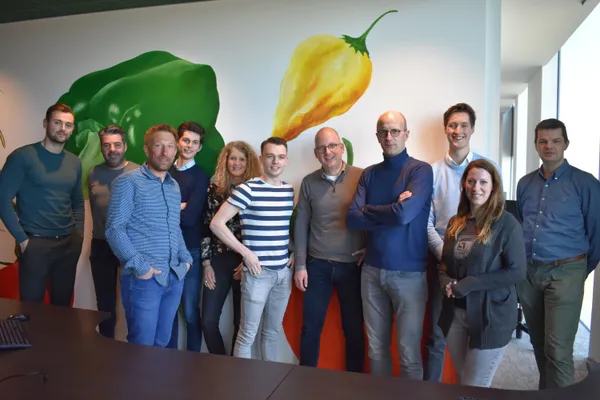
Part of the Chainn team in the new office
Our company philosophy is anchored in our organization from the bottom to the top. So, I don't have to change much about its content. But, of course, we're pleased that the pandemic is nearing its end. We offered the possibility of working from home, but, in the end, most people came into the office. We did, however, very much encourage people to take the precautions seriously at work and home. Our team was, luckily, infection-free for the first 18 months.
Do you expect other companies to copy your business model?
Most certainly, but it won't be easy for everyone. Companies with large teams or warehouses carry considerable costs. So, they have to move large volumes. Then, as soon as a country like Russia imposes a boycott, you have a real problem. We're, of course, responsible for our 20 employees and their families, but that's a completely different cost pattern. We don't have to become the biggest or richest. Before you know it, you outgrow yourself. It's vital to expand calmly and deliberately. And we want to have fun.
It's fantastic to hear a grower in South Africa explain why they want to sell their produce through our model. Ultimately, we hope companies will emulate our business model because more parties are needed to make this way of working the new normal. Please, let the next app emerge tomorrow; that will strengthen us too. Our system works great, but it's just a system that helps us achieve our goals. Our way of working and passion make the difference. A cyclist needs a good bike, but that alone won't win him the Tour de France.
You are very tech-savvy. Are expensive implementations not too costly? And do you have enough in-house IT know-how?
Our platform certainly costs money, maybe a bit too much at times. But, if you want to stay ahead, that's all part of the game. You're aware of what you're spending. I do believe in doing things collectively to keep the costs down. We certainly have IT knowledge. I have some experience with implementing a new package. We also have a true IT specialist in-house. But I don't really need to have a complete IT team; there are specialists for that.
You have been working quite unobtrusively for the past few years. Is this interview a prelude to more news?
We, indeed, don't think it's a good idea to seek out publicity, even though we've made a true mark on the market with some of our business lines. And we want to promote those more. We want to make the same impact on our industry, by 2025, as [the Dutch] Bol.com and Amazon have in their field. They've taken those markets into a truly new era. We want to be our industry's most attractive, well-known connector. But then we must take to the stage more. Otherwise, we may become a formidable yet unfamiliar company.
Chainn B.V.
+31-88-222-1000
[email protected]
www.chainn.nl
